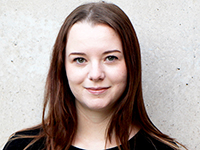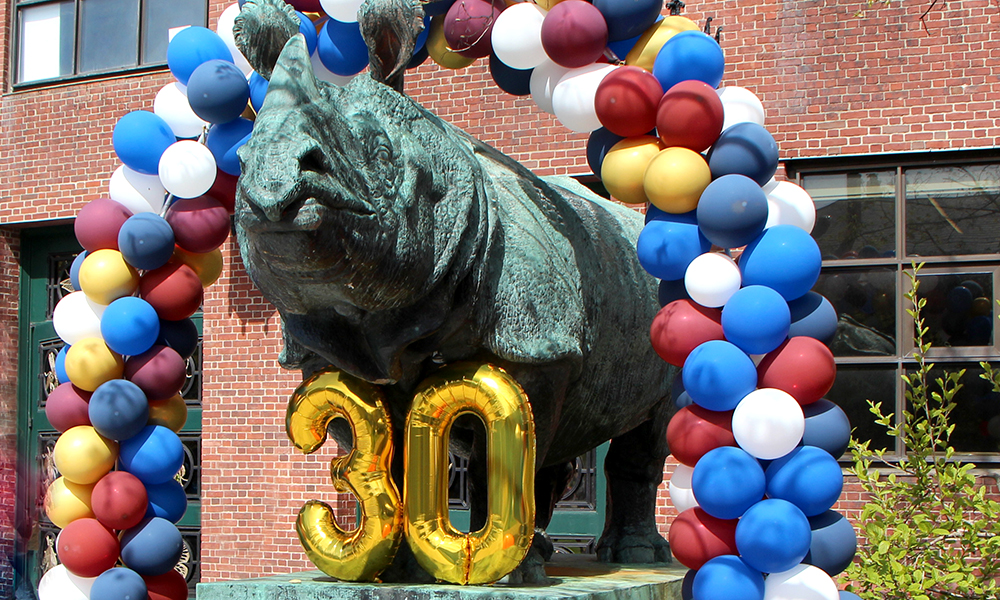Because of the myriad of scientific discoveries that have been made in the Biolabs building, I have always thought that our department, MCB, is over 100 years old. Imagine my surprise when last week, I walked past a dozen or so banners outside the building exclaiming, “MCB is 30!” A department news article explained that a historical merger between two departments caused my confusion. Nevertheless, 30 years is a huge milestone, and to celebrate, MCB hosted a 30th birthday celebration in the Biolabs courtyard on May 3rd. As a more introverted member of MCB, I saw this unique, celebratory event as an opportunity to step outside of my comfort zone. To my surprise, I left the event with a stronger sense of community and a new appreciation for the importance of MCB-wide social events.
As anyone who lives in the greater Boston area knows, you can never count on the weather to play nicely for an outdoor event at this time of year. Given the grim forecast, flyers advertising the event stated, “No rain date. We’ll party in the mud.” Much more conducive to a celebration than mud, a clear sky and a bright sun draped over the event. In true MCB fashion, it was not long before a pickup beach volleyball game began. Community members ate cookout-style food, tossed around enormous inflatable beach balls, and swayed to music ranging in style from Taylor Swift to Queen. It was clear that Francisco Arellano, MCB’s events coordinator, successfully executed his intention to “encourage everyone to get together, [including] all the labs, faculty, students, staff, admin staff.” Having organized numerous other MCB events, Francisco stated, “All events are different, and today, it’s a celebration!”
“This event includes nods to the past, the current MCB, and the future,” Rachelle Gaudet, department chair, stated as she addressed the crowd. MCB’s “past” was honored as Rachelle gave us a brief history of the department’s conception and highlighted the founding faculty members. A nod to the “future,” we hopped aboard the Biobus, an outreach endeavor that “helps K-12 and college students discover, explore, and pursue science.” As someone who believes outreach should be a priority in every scientist’s career, I was excited to see other community members on the Biobus look at squiggly sea creatures under microscopes, take photos of their eyeballs, and sign up to volunteer for the organization. Lastly, a poster session showcasing current research across MCB labs nodded to the department’s “present.”
When I learned that there was going to be a poster session at an event aimed at promoting community within the department, I was skeptical. Most scientific poster sessions include posters loaded with highly-detailed research results, making it difficult to walk away with general understandings of what folks are working on; however, this poster session was unique. Each lab’s poster featured straight-to-the-point descriptions of the lab’s research goals and techniques, and some posters included photos of lab members. Maya Waarts, a graduate student said, “It’s been nice having faces on the posters. We’ve been noticing people who we see around our building but don’t necessarily know what lab they’re in or what they do.” The community-building aspect of this poster session was no accident; Alexa Pérez-Torres, Media and Design Fellow at the Bok Center Learning Lab and an MCO graduate student in the Murray Lab, organized this poster session with careful intention. She said, “I think that as poster viewers, it’s not entirely easy to remember what people tell you…All you need, because that’s going to be the take home, is the bare minimum.” She successfully relayed this intention to poster creators by sending out clear guidelines, poster templates, and examples of exactly what she was looking for. This attention to detail certainly paid off. Fardin Aryan, a graduate student, described the posters as “really approachable to the entire MCB community.” Alexa hopes that this session will inspire attendees to re-think the way they approach scientific posters in the future. Personally, the posters gave me a much better understanding of the breadth of research going on in the department than I have gotten from more traditional poster sessions. I even identified a few labs using techniques that I am interested in, inspiring possible new collaborations.
As a graduate student in a program based on the Longwood campus completing my thesis work in an MCB lab, I mostly interact with folks also based in Longwood or in labs adjacent to mine. In the week leading up to the 30th birthday party, chatter snaking through the halls of Biolabs gave me the sense that everyone– ranging from undergrads, to staff, to faculty– planned to attend. I have attended other MCB social events, but recognizing my tendency to latch onto my sub-MCB network, I challenged myself to use the 30th birthday to get a better sense of MCB as a whole. Socializing in the sun, hearing about MCB’s history, getting excited about outreach efforts, and learning about research from MCB labs in an accessible way showed me how important these events are to community building in MCB. Sarah Craig, a research assistant in the Dulac Lab, told me, “The environment [in MCB] is very welcoming and supportive of people in various positions, and I think the amount of events that the department hosts makes it easier to meet people and make those connections.”
MCB labs are distributed across buildings, and rather than open-space concepts, a lot of labs have their own closed-off research spaces; therefore, it takes some effort to get to know our community as a whole. It is clear that our department leaders put a lot of thought and effort into lowering this activation energy, and talking to attendees of this event showed me how much our community relies on MCB-wide social events. Attending the 30th birthday celebration with an open mind left me with a newfound confidence to expand my network within the department, and I hope that sharing my experience will encourage any other introverts that may be hiding away in MCB to do the same.

Courtney Whilden is a graduate student in the Program in Neuroscience, and she is completing her thesis research in Amanda Whipple’s laboratory. Passionate about science communication and community-building, Courtney hopes that the new “Inside Perspective” series will offer fresh angles on news that centers the experiences of MCB community members.


